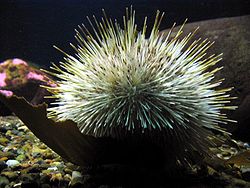echinus
Hello, you have come here looking for the meaning of the word echinus. In DICTIOUS you will not only get to know all the dictionary meanings for the word echinus, but we will also tell you about its etymology, its characteristics and you will know how to say echinus in singular and plural. Everything you need to know about the word echinus you have here. The definition of the word echinus will help you to be more precise and correct when speaking or writing your texts. Knowing the definition ofechinus, as well as those of other words, enriches your vocabulary and provides you with more and better linguistic resources.

echīnus (1, sea urchin) 
echīnus (2, hedgehog)
See also: Echinus
English
Etymology
From Latin echīnus (“hedgehog; sea urchin”), from Ancient Greek ἐχῖνος (ekhînos).
Pronunciation
- Rhymes: -aɪnəs
Noun
echinus (plural echinuses or echini)
- A sea urchin.
- 1929, Sir Arthur Conan Doyle, When the World Screamed:
- 'It is a sea-urchin - a common echinus. Nature repeats itself in many forms regardless of the size. This echinus is a model, a prototype, of the world.'
- (architecture) The rounded moulding forming the bell of the capital of the Grecian Doric style, which is of a peculiar elastic curve.
- (architecture) The quarter-round moulding (ovolo) of the Roman Doric style.
- (architecture) The egg-and-anchor or egg-and-dart moulding, because often identified with the Roman Doric capital.
Part or all of this entry has been imported from the 1913 edition of Webster’s Dictionary, which is now free of copyright and hence in the public domain. The imported definitions may be significantly out of date, and any more recent senses may be completely missing.
(See the entry for “echinus”, in Webster’s Revised Unabridged Dictionary, Springfield, Mass.: G. & C. Merriam, 1913, →OCLC.)
Anagrams
Latin


Etymology
From Ancient Greek ἐχῖνος (ekhînos).
Pronunciation
Noun
echīnus m (genitive echīnī); second declension
- a sea urchin, especially the edible kind
- a hedgehog
- the prickly husk of a chestnut
- a rinsing bowl, especially of copper
- (architecture) an ornament under the chapiter of an Ionic or Doric column
Declension
Second-declension noun.
| singular | plural | |
|---|---|---|
| nominative | echīnus | echīnī |
| genitive | echīnī | echīnōrum |
| dative | echīnō | echīnīs |
| accusative | echīnum | echīnōs |
| ablative | echīnō | echīnīs |
| vocative | echīne | echīnī |
Synonyms
- (hedgehog): ērināceus
Derived terms
Descendants
References
- “echinus”, in Charlton T. Lewis and Charles Short (1879) A Latin Dictionary, Oxford: Clarendon Press
- “echinus”, in Charlton T. Lewis (1891) An Elementary Latin Dictionary, New York: Harper & Brothers
- echinus in Gaffiot, Félix (1934) Dictionnaire illustré latin-français, Hachette.
- “echinus”, in The Perseus Project (1999) Perseus Encyclopedia
- “echinus”, in Harry Thurston Peck, editor (1898), Harper’s Dictionary of Classical Antiquities, New York: Harper & Brothers
- “echinus”, in William Smith, editor (1854, 1857), A Dictionary of Greek and Roman Geography, volume 1 & 2, London: Walton and Maberly
- “echinus”, in William Smith et al., editor (1890), A Dictionary of Greek and Roman Antiquities, London: William Wayte. G. E. Marindin